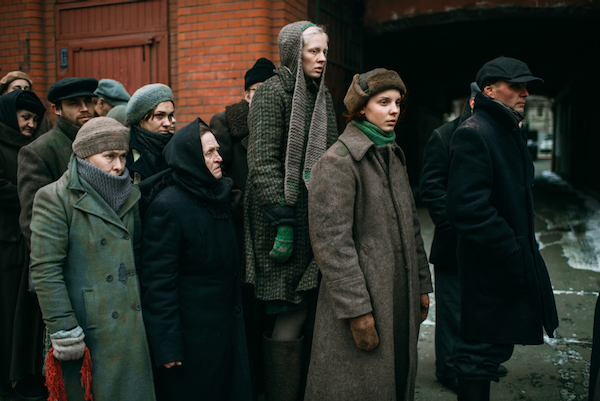Movie review by Greg Carlson
Following a 2019 premiere in the Un Certain Regard program at the Cannes Film Festival, director Kantemir Balagov’s second feature has made the Oscar shortlist as Russia’s entry for Best International Feature Film. A historical drama photographed in a palette of unexpectedly vibrant hues that expands well beyond the desaturated grayscale so commonly associated with recently made WW2 stories, “Beanpole” plunges into the horrific aftershocks and physical and psychological traumas resulting from the Siege of Leningrad. Named after imposing nurse Iya (Viktoria Miroshnichenko), “Beanpole” belongs equally to Vasilisa Perelygina’s Masha.
Not everyone will warm to the audacity of Balagov’s juxtaposition of personal hellscapes and gorgeous, artful compositions. The dominant presence of ruby reds and emerald greens heralds the kind of color-theory possibilities identified by Donald Spoto when he contemplated Alfred Hitchcock’s “Vertigo.” For some, Balagov’s technique is an affront to the realities of life during and after wartime — a grotesque display capitalizing on abjection. Others will most certainly see warmth and humaneness in the way the director seeks to understand how so many figure out how to function after nearly everything of their peacetime world has been erased. The former might claim that the movie is misery porn. For the latter, “Beanpole” resonates with haunting particularity.
Sometimes working against its ambitious agenda, the film’s 130-minute length rewards the most patient viewer with a series of bombshell payoffs in the later sections for ideas that Balagov establishes in the enigmatic opening of the film. The director withholds certain key pieces of information for maximum impact, but he also activates privileged viewership, involving the watcher by sharing secrets some characters don’t know. The most potent example of the latter constitutes a spoiler if rendered in detail. It’s a heartbreaking, even excruciating, long-take close-up that results in a tragedy.
The complexity of the characterizations of Iya and Masha, each of whom deals with her demons in distinct ways regularly in conflict with the other, is perhaps the movie’s biggest asset. Iya, placid and quiet, copes with the lasting challenges of a concussion and its related seizures. Masha, no longer able to have children, convinces Iya to become her surrogate. Masha’s more demonstrative and extroverted nature, accompanied by a well-practiced smile and willingness to take decisive action, masks her own pain. A riveting dinner table scene at the home belonging to the parents of Masha’s boyfriend Sasha (Igor Shirokov) will illuminate how Masha survived an 872-day invasion.
Masha and Iya, sometimes on purpose and occasionally by accident, are locked in a codependence that threatens to spiral out of control. Balagov, still in his 20s, works with the confidence and maturity of a much older veteran. The director shares screenplay credit with Alexander Terekhov, and “Beanpole” masters the unseen, the unspoken, and the “presence of absence” in the way it unpacks the toll of ongoing armed conflict through a kind of metonymic expression of experience. It is hard to say whether Balagov believes as much in hope and healing as he acknowledges the madness and sorrow of war, but he makes certain we see the scars that mark the two protagonists.
